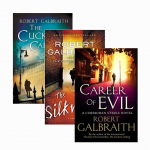Robert Galbraith grants a rare interview to BBC2

Nov 05, 2018
Cormoran Strike series/Robert Galbraith, Cormoran Strike TV Series, Interviews, J.K. Rowling, JKR Interviews, Lethal White, News
Robert Galbraith is famously shy and reclusive when it comes to interviews. He likes to let his murder mysteries speak for themselves. But, in the wake of publication of the fourth Cameron Strike/Robin Elacott novel, Lethal White, he took time out from working on the next Strike adventure to speak to the BBC2‘s Graham Norton.
Before her alter ego made an appearance, J.K. Rowling explained his genesis:
“I wanted not to be me…I’d always wanted to write crime, and I wanted to not do it with any fanfare. So, I submitted the manuscript anonymously and it was all great. I even enjoyed getting rejection letters again. It was fun; it was fantastic—it was just like it used to be. I obviously needed a pseudonym and it was a little bit random really. Robert Kennedy was a hero of mine so I chose Robert. And Galbraith, for some reason I always liked. And then when I was unmasked, when I was outed, people analysed the name…you know, things get overanalysed sometimes.”
Rowling laughed and marvelled at some of the meanings that people attributed to her choice of pseudonym but, given the care and research she put into every name in the Harry Potter series, she should not be surprised. When you call your magizoologist Newt Scamander and your villain “I am Lord Voldemort”/Tom Marvolo Riddle, you can expect perpetual intense scrutiny on that score.
Norton then asks Rowling if she thought she’d get away with the ruse.
“Yeah. Well, I did get away with it up to a point…I had written the second book before I was unmasked but it wasn’t out yet. My ambition was to try and get three out without being unmasked because then I thought it would have a bit of momentum. If it’s going to live on its own merits then, you know, I might get that far. I was a bit unlucky the way it happened. I actually thought—I can say this now because I’m in the BBC and I know it wasn’t the BBC—but the BBC actually approached Robert without knowing it was me, which put me in a real quandary, and I had this bizarre meeting with my agent and my editor and I said to them, well, what do we do? This is an amazing thing that they have called us to try and adapt it for TV but I obviously can’t take this meeting. And my agent, God bless him, Neil, he said, oh, we’ll just say that Robert wants to get more books out before he commits, and I said, no, we can’t say that! J.K. may say that but Robert can’t say that—he’s a first time author, he’d be biting their arm off! And then, when it leaked initially, for about four horrible days actually, we didn’t know how it had leaked because so few people knew the secret and I thought someone at the BBC has put two and two together here: Same publisher, same agent, and this guy won’t take a meeting, come on! So I thought it had probably leaked from the BBC and then when I found out how it had leaked it was a bit of a shock.”
Rowling says she is proud of the BBC series and Norton asks her if it affects her writing now, if she sees, for example, Tom Burke, who plays Cormoran Strike, in her mind’s eye.
“It’s a sort of hybrid. So I had a really clear mental image of my Cormoran Strike, as it were, and Tom is far more attractive than that Cormoran Strike that I was seeing. And now I see a sort of weird hybrid in my head because he is so brilliant in the role that I would say he definitely is visually in my head, though he’s playing the character exactly as the character is written, I think, so he doesn’t really influence the personality of the character.”
Norton then asks why Lethal White is set during the summer of 2012, when London hosted the Olympics, and gets a deeper answer than he expected:
“The first book is set in 2010 and I chose to set it then because, and I do think in retrospect I was right, I had this weird sense that in 2010 we were coming to the end of something…Britain was changing in some fundamental way. I think the financial crash had just happened, and obviously we were heading towards this new coalition government—remember those halcyon days before Brexit—and, um, so, that’s why we’ve moved on three books and we’re now in 2012. So I’m lagging behind time-wise, which in some ways is quite nice because you get a bit of perspective on what it was and the Olympics were such an extraordinary time in London that it appealed to me a lot as a sort of glimpse at a different kind of Britain.”
Rowling places Strike’s office in Denmark Street, which, despite the fact that it contains historic buildings dating from the 17th century, is being destroyed by a misguided development scheme. Norton asked her if she knew that it was a goner.
“Well, I didn’t know it was a goner, I knew that it was sort of going, and that in itself is interesting because of what’s happening in London…Strike realises that his beloved office might be sold out from under him.”
Why didn’t Galbraith write Strike as a member of the police force?
“I set myself the challenge of writing what I think is a sort of classic whodunit with all of the golden age atmosphere of having one or two people working undercover in a very contemporary setting. So, Strike and Robin are a bit of an anomaly in crime fiction at the moment because we’re seeing a lot of police procedurals and so on, and I deliberately wanted to pick someone—it’s just quite a romantic idea, the private detective, but it’s contemporary in that he is a veteran of a recent war and there are issues around his disability and the fact that he’s ex-army, and all of that really appealed to me. And there are a lot of challenges in writing that kind of novel now because he doesn’t have access to, sort of, DNA evidence and so on in the way that the police do. But that in itself is interesting, you know, so though he’s this slightly gawky figure who is still doing old-fashioned detection.”
Despite these constraints, Strike has become successful in his business, “so that brings its own challenges, and that interests me, too…[insert joke about Freud]…someone who really does want to be undercover, who really does want to be anonymous, and the inevitable corollary of their success is that they can’t be entirely that anymore but, like his author, he sometimes does use his celebrity, as you may know, because he does find in this book that some people are keener to speak with him because he is famous.”
Rowling notes that this novel took a particularly long time to write “because I was simultaneously working on a play and two screenplays.” Hmmm, I think we have some idea what those turned out to be. No-one can accuse J.K. Rowling of resting on her laurels, that’s for sure!
Despite being the longest of the series so far, and having the most complicated plot, Rowling says, “I loved writing it. I really enjoyed writing this book. It’s probably my favourite of the series in terms of how it turned out. But, also, just sheer enjoyment.”
Wonderful for us that she still loves writing, as we are always eager for more of it!
Asked about the difference between writing about the wizarding world, which Rowling created and totally controls and makes the rules for, and writing within the constraints of the real world, she replied, “It’s so different and it’s wonderful. I love going to real places to research them. I love writing about the actual physical world. It’s such a contrast to this entirely invented society. I enjoy both of them but this has its own particular pleasure.”
But how can the famous J.K. Rowling study locations? Like Strike, her fame makes it harder for her to appear in public incognito. Does she wear a wig, enquires Norton. “No! I really do manage to lead a very unnoticed life, which is just the way I like it. I think, as a woman, and not a particularly tall person, I can blend in quite easily. But we did have one really funny experience. There’s a little cafe by Smithfield Market that I used as a location in the second Strike book, and this was before I’d been unmasked, and my husband and I went there really early, I wanted to see what it was like—it was just so atmospheric, opposite the meat market—and this man came in…he’d just been unloading meat carcasses, and he said at the top of his voice, “Someone told me J.K. Rowling was in here.” And then he looked directly at me and said, “I wouldn’t know what she looks like,” and walked out again.”
At times, just like Strike, Rowling can use her fame to gain access to locations. Significant parts of Lethal White take place within the House of Parliament and Rowling was able to use her status to get a special tour.
Rowling had mentioned earlier in the interview that she had hoped to get at least three books out before her identify was discovered. Norton asked her if she had thought of writing more than three Strike mystery novels.
“Well, I actually planned to go beyond that. I mean, I think I could easily write ten of these, but…I genuinely didn’t know whether it would get published, because I was going in as a total unknown, and then when it did find a publisher I thought, well, I know how publishing works, so I thought, well, if they’re not very successful, no-one’s going to want to keep publishing them. So, I had a genuine ambition that maybe I would get three out and, I suppose, from my Potter experience I know that at three a series will start to gain a certain momentum, so that was my ambition.”
Norton notes sadly that even really good books often go unnoticed. Rowling acknowledges:
“There is always an element of luck in everyone’s success, including mine.”
This BBC2 show features music as well as guest interviews, and Rowling had the opportunity to choose a song. She picked “Wherever You Will Go,” by The Calling, which is played in the first chapter of Lethal White. It’s the song that Robin and Michael chose for their first dance. With lyrics like…
“So lately, been wondering
Who will be there to take my place
When I’m gone you’ll need love to light the shadows on your face”
…it’s a slightly off-kilter choice for a wedding, which is the point, although the rest of the song more fittingly expresses a sentiment of lifelong love.
Before the interview wrapped up, they took a few questions from listeners. One fellow asked which of the four Strike books was the easiest and quickest to write. Oddly phrased question, as it’s hard to imagine such intricate mystery plots, where you have to dole out clues and red herrings with painstaking cleverness, would ever be either quick or easy to write. Norton opines that the easiest was probably the first one. Rowling responds:
“No, actually, it was the second one. Silkworm was the easiest and quickest to write because I had that plot first but I chose to write it second because I had this arc in my mind of Strike: I thought his first case has to be one that would give him a certain amount of notoriety and an obscure writer didn’t do that so his first case is the death of a supermodel.”
Another listener asks if she is more pleased with the success of novels or films and she responds “novels.” That seems natural since she writes them and the screen versions, whether movie or TV, are adaptations usually made my others. Norton notes that she has not done the adaptation for the Strike TV series and Rowling replies modestly, “It’s a particular skill and I am not sure that I have it.” Norton counters that she does write screenplays. “I think that’s different. It’s not adapting an original work, I’m actually inventing there so it feels different.”
Was it weird, though, writing that first screenplay, Norton wants to know.
“Oh, God, yes. It’s such a different discipline, so very different from novel writing, and I think I am definitely meant to write novels. Having said that, part of the pleasure of writing screenplays is how collaborative that process is and I do really enjoy that part of it.”
A listener asks how easy it is to make changes along the way given the intricate plotting of a whodunit. Good question—it must be very different than in the Potter series, when she could change her mind about killing off Mr. Weasley and kill Remus and Tonks instead. So, does she make changes in the mystery novels?
“Well, I don’t. By the time I commit to writing these novels, I know exactly who did it, how they did it, why they did it…I don’t change my mind.”
Norton follows up by asking a more nuanced question about whether the characters can change as you write them, even if the plot is immutable.
“No…I spend a lot of time with the characters before I really commit to writing the whole novel so I do very, very detailed plans. I’ve got to know them before I set them all in motion.”
Did she think of recording the audiobooks herself, asks another listener.
“No way, I couldn’t do it. I am by no means an actress. I hate the sound of my own voice. [She said, speaking on the radio, but I won’t listen to it, so that’s fine.]…No, I definitely don’t want to read my own books. I would find that painful and embarrassing. And also, as you read it—and I know this from doing book events—you immediately start editing it in your head. You read and you think, ‘Why on earth did I write it like that? This sentence is much more natural the other way around.’ It is a horrible experience.”
Elucidating further her experiences promoting her books, Rowling confides that, “I was borderline phobic about public speaking. So, it’s been a really long journey for me to get to a point where I can comfortably stand up in front of a lot of people and read my work.” Rowling goes on to say that most of her public speaking is now on behalf of her children’s charity, Lumos, which presents different kinds of pressures. On public speaking in general, she concludes, “I’ve definitely gotten more used to it but I don’t think I am ever going to love it.”
Rowling had said that she could imagine doing ten Strike novels, so Norton asks her if she has another six in her head already.
“No, I don’t, but I know the plot of the next one, and I think I know the plot of the one after that.”
Norton quips that she needs an iCloud storage device for her head. “…an iHead. Yeah, I do think obsessively about these things, it is a compulsion, really.”
More questions from listeners:
What was the last book you read and couldn’t put down?
“The last book I read and absolutely loved is quite an old book, it’s Caroline Blackwood’s The Last Duchess, which is a very sinister book about the Duchess of Windsor…it’s well-written and beautiful and creepy.”
Are you more like Strike or Robin?
“I am probably more like Strike.”
You get to talk about success via Strike…
“It’s a very satisfying way of talking about that, actually, through that character.”
The interview shifts to how Rowling’s work has now inspired several generations of children to read, and Norton reads out some notes of thanks from grateful parents. Rowling, one can tell, never gets tired of hearing this and clearly feels it is one of the most meaningful forms of praise her work could receive.
“Books have been my escape, my solace, my everything, at certain times in my life, and I love the idea that the Potter books were that for other people. I really do.”





